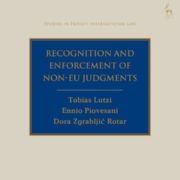New Book Alert: Recognition and Enforcement of Non-EU Judgments
An upcoming milestone in private international law — Recognition and Enforcement of Non-EU Judgments (Bloomsbury / Hart Publishing, Feb. 19 2026), edited by Tobias Lutzi, Ennio Piovesani, and Dora Zgrabljic Rotar.
This is not just another doctrinal text, but the first comprehensive comparative deep dive into how EU Member States handle judgments from outside the EU, an area of law that has been notoriously fragmented and under-theorized.
The book contains country reports from 21 EU Member States on their national rules on recognition and enforcement of non-EU judgments in a unified framework, giving the reader both breadth and comparative depth. The editors pull these strands together in a detailed comparative report that highlights patterns of convergence and divergence across EU jurisdictions. Additionally, the book situates the Member State approaches in relation to the Brussels I regime and the 2019 HCCH Judgments Convention, which is itself reshaping global judicial cooperation. It had practical and scholarly appeal
The release date is 19 February 2026 and it is available for pre-order already at here.

